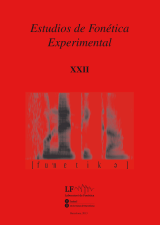TP (v. 3.1): a tool for experiments of perception
Keywords:
software, perception tests, perceptual trainingAbstract
This paper aims at presenting a new tool developed to help researchers from various areas design perception tests intuitively and without having to know programing. Furthermore, it is intended to be a tutorial of the tool in Spanish. TP (Perceptual Tests/ Perceptual Training) is an open source application software which includes perceptual tests and training tasks (sound, image and video) with immediate feedback and was created as an alternative to existing softwares (Rauber, Rato, Kluge, Santos, 2012). Firstly, the functions of the program will be described in detail. Then, the different experiments that can be designed in TP will be showed. Finally, some considerations about the program will be provided.
References
BOERSMA, P. y D. WEENINK (2012): Praat: doing phonetics by computer, v. 5.3.04.
http://www.praat.org. [15/01/2012]
RAUBER, A. S.; A. RATO; D. KLUGE y G. R. SANTOS (2012): TP: Testes / Treina-mentos de Percepção.
http://www.worken.com.br/tp_regfree.php [25/08/2012]
RAUBER, A. S.; A. RATO; D. KLUGE y G. R. SANTOS (en prensa): «Software: A tool for designing audio, visual, and audiovisual perceptual training tasks and perception tests», Procedings of INTERSPEECH 2013, Lyon (Francia), 2013.
Downloads
Published
How to Cite
Issue
Section
License

This work is licensed under a Creative Commons Attribution-NonCommercial-NoDerivatives 4.0 International License.
All articles published online by Estudios de Fonética Experimental are licensed under Creative Commons Attribution-NonCommercial-NoDerivs 4.0 International (CC BY-NC-ND 4.0 DEED), unless otherwise noted. Estudios de Fonética Experimental is an open access journal. Estudios de Fonética Experimental is hosted by RCUB (Revistes Científiques de la Universitat de Barcelona), powered by Open Journal Systems (OJS) software. The copyright is not transferred to the journal: authors hold the copyright and publishing rights without restrictions. The author is free to use and distribute pre and post-prints versions of his/her article. However, preprint versions are regarded as a work-in-progress version used as internal communication with the authors, and we prefer to share postprint versions.




